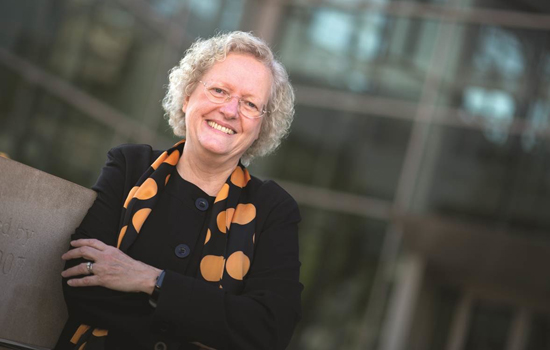Purdue dean gets first Kate Gleason Medal
Purdue engineering dean Leah Jamieson becomes first recipient in recognition of her innovation in developing engineering leaders of the future
Purdue University College of Engineering
Purdue University dean of engineering Leah Jamieson is being recognized with the first Kate Gleason Medal for Leadership in Engineering Education.
Engineers advance new technologies that make innovative products possible. And in doing so, engineers are shaping the future of society.
In recognition of the influential role that the academic leaders of engineering colleges play in creating the engineers of tomorrow, the Kate Gleason College of Engineering at Rochester Institute of Technology has established the Kate Gleason Medal for Leadership in Engineering Education.
The college will bestow its first award on Purdue University dean of engineering Leah Jamieson. She will be honored in a ceremony at 12:30 p.m. Thursday, April 23, in the Xerox Auditorium in RIT’s James E. Gleason Hall. Following the awards ceremony, Jamieson will present a public lecture to students and faculty on her vision for the future of engineering education.
“The award is inspired by the reality that the future of our society is shaped by the work of engineers, and the shaping of those engineers is the business of engineering colleges,” said Harvey Palmer, dean of RIT’s Kate Gleason College of Engineering. “Those individuals who are providing outstanding leadership at engineering colleges deserve special recognition, for the good of our nation and our global society.”
Recognized internationally for her achievements in education, research and service, Jamieson has played an integral role in the development of Purdue University’s status as a top engineering school in the country. She began as an assistant professor of electrical engineering at the university in 1976 and has held a succession of leadership positions, from graduate coordinator and department head to distinguished professor of engineering, prior to becoming dean.
One of her most indelible accomplishments is the development of EPICS—the Engineering Projects in Community Service program—co-founded with Edward Coyle in 1995 at Purdue, to fulfill the complementary needs of undergraduate engineering students and the community by providing design-based education in a service-learning context. Students in EPICS participate in design projects that solve technology-based problems identified by local not-for-profit organizations. Teams are multi-disciplinary, including students from engineering disciplines as well as liberal arts and other programs who work together over several semesters. Since its founding 20 years ago, more than 8,500 Purdue students from across campus have participated and delivered 300 projects to the Greater Lafayette, Ind., community. It has become a widely recognized national program operating in more than 20 U.S. colleges and 17 countries.
The Kate Gleason Medal is named after Kate Gleason, who was business leader, inventor and the first woman elected to the American Society of Mechanical Engineers. Her influence on her family’s company, Gleason Works, was transformational, as she led the way to globalization for U.S. manufacturing in the late 1800s. Among her many other accomplishments, she was the first female president of a national bank in the U.S. and was an innovator in the development of affordable housing for factory workers.
“RIT’s engineering college is extremely proud to be named after such an extraordinary woman,” said Palmer.
Jamieson has had a similar influence as a leader, with a résumé that includes achievements in education, research, administration and professional service that all link to advancing the engineering profession and the quality of engineering graduates, not only at Purdue but across the nation. Her contributions to engineering education have been recognized at the highest level, earning her election to the U.S. National Academy of Engineering.
“While applauding extraordinary achievement as a leader in engineering education is the primary motivation for creating the Kate Gleason Medal,” said Palmer, “we are also hoping to gain significantly in the long term from tapping into the expertise, insights, knowledge and experience of Medal winners, to help RIT become even stronger than it is today.”
The Kate Gleason Medal itself is modeled after the bronze sculpture of Kate Gleason, created by regional artist Don Sottile, and located in the central atrium of the engineering college. RIT Professor Denis Cormier, a leading researcher in 3D print and additive manufacturing technologies, designed the medal such that it can only be produced through the use of advanced 3D printing technologies, such as those being developed within the college.
The Kate Gleason College of Engineering intends to award the Kate Gleason Medal each semester, or twice each year.







